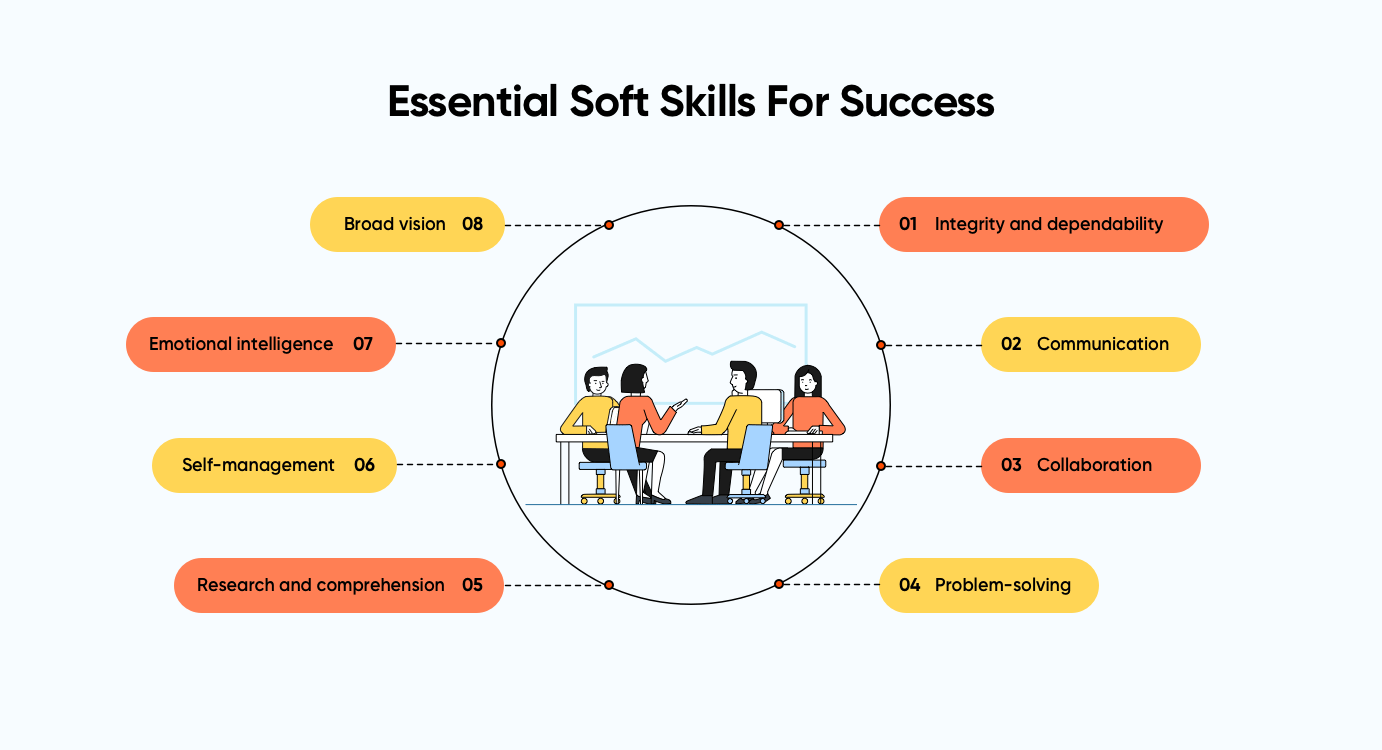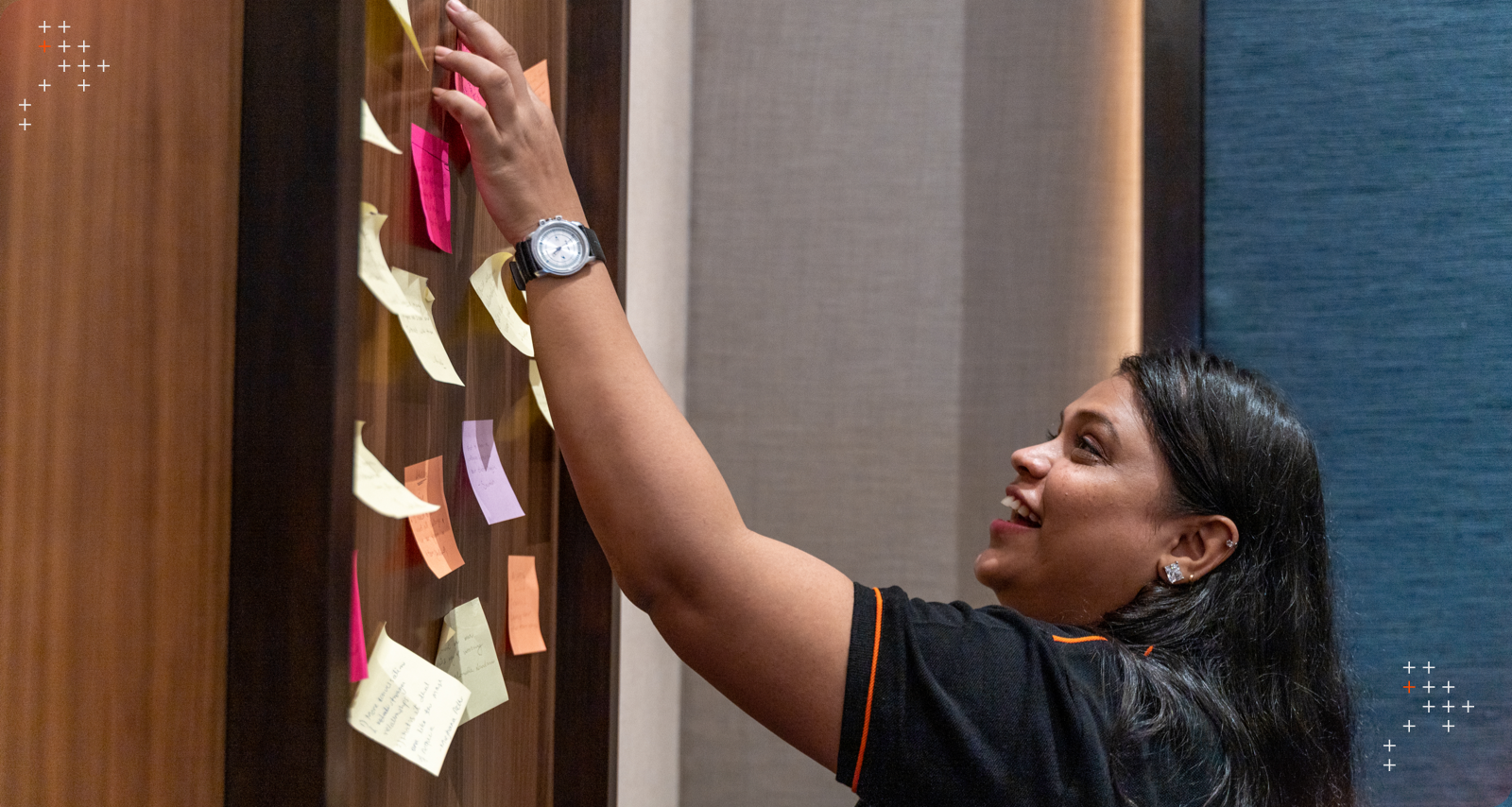Introduction
The article explores the meaning and importance of soft skills and how professionals can identify and develop soft skills gaps.
Every professional faces experiences that highlight gaps in their soft skills. The wise ones work on themselves and improve.
They understand the value and necessity of improving their soft skills.
Unfortunately, some professionals struggle to see these gaps in certain aspects of their behavior.
Work becomes a struggle for them and the people around them.
And they find their careers stagnated. That's how important it is to have polished soft skills.
Make no mistake; there's nothing "soft" or secondary about these skills—because having these aptitudes can be the difference between an extraordinary career and one filled with friction and stress.
- What are soft skills?
- Why are soft skills important at work?
- How are soft skills different from hard skills?
- What are the most essential soft skills for professional success, and how do you develop them?
What Are Soft Skills?
Soft skills—or, more accurately, people skills—are personal qualities, behavioral patterns, and habits of a person that affect how one interacts and behaves while working with others.
People need these skills to navigate everyday life at work, home, and other social circles.
The more refined these skills, the easier it is for people to connect, communicate, and collaborate.
It's about how one carries oneself with other people.
Why Are Soft Skills Important At Work?
If we lived by ourselves, utterly independent of the world and its people, we probably wouldn't have needed soft skills at all.
Humans are social beings.
We work in groups and depend on each other for our livelihood and safety.
Learning to get along with people is a primary requirement—and everyone starts from scratch. (That's why these behavioral and personality traits are called "skills.")
And nowhere is the importance more pronounced than at work; our livelihood depends on our work and professional growth.
Better Hiring Prospects
Recruiters and managers want people with proven soft skills.
According to this LinkedIn survey, people skills have become more important than hard skills, and recruiters will often reject a candidate—otherwise proficient at their core job related skills—for a lack of soft skills.
They will intentionally test your level of mastery through subjective and situation-based questions during the interview.
Candidates who can conduct themselves professionally and collaborate effectively with minimum friction contribute positively to team dynamics.
Better Professional Growth
Some soft skills like communication, adaptability, collaboration, critical thinking, and decisiveness make one more suited for leadership roles.
Demonstrating these skills in your daily interactions at work will put you as a front-runner when a leadership opportunity arises.
Your leaders will feel more confident about project and team success under your guidance.
Good Relationships
Businesses revolve around people. People run companies. People make up customers, investors, clients, and vendors.
Work revolves around people, too—to solve their pain points.
Polished soft skills, like communication, collaboration, and integrity, will enable you to connect and build strong relationships with others.
And strong relationships mean good work dynamics, access to willing help when stuck, and getting picked for better prospects.
Better Adaptability To Changes
Change is a constant in dynamic and growing workplaces.
Organizational growth results in expansion, and expansion necessitates more change—in systems, people, and processes—to scale effectively.
Soft skills, particularly adaptability, empower you to navigate these changes frictionlessly. And fast.
Heightened Work Satisfaction
Better work satisfaction is a cumulative result of the positive consequences of having good soft skills, such as effective communication, friendly collaborations, and better leadership ability.
These factors eventually contribute to an overall sense of accomplishment and contentment.

How Are Soft Skills Different From Hard Skills?
Hard skills are specific and measurable abilities that one needs to do their core work. For instance, a software engineer's hard skills are coding, data analytics, programming, etc.
Hard skills are directly related to one's work.
On the other hand, soft skills are intangible qualities that influence one's behavior with others and how well one can thrive in a work environment.
Both are equally essential for long-term success, especially now, as organizations gradually realize the importance of having a supportive, positive work culture.
What Are The Most Essential Soft Skills For Professional Success?
The following soft skills are often interrelated with each other.

When you work on improving one skill, it might lead to improving others, too.
And you might feel it's like a lucky coincidence. But it's never so.
Each skill is a part of your character, and when you improve individual skill gaps, you'll automatically improve your personality—becoming a better, well-rounded professional.
Integrity And Dependability
There is hardly anything as crucial as integrity at work.
It takes a long time to build and continuous effort to maintain.
It demands honesty, openness, and sticking to one's word.
You connect the line between what you say and what you do, which includes meeting deadlines, sticking to agreements, and delivering on promises.
How do you practice integrity at work?
- Plan your work and communicate what you intend to do
- Execute your plans openly and stick to the mentioned timelines
- Communicate openly about blockers and ideas and negotiate your work according to priority (don't try to do everything all at once—you'll either push yourself to burnout or miss the deadlines)
- Own up to your mistakes and take responsibility for your actions
- Stick to the company values and ethics, even while making tough decisions
- Respect the confidentiality of sensitive information of your organization and team members
By sticking to these behavioral traits, you can establish yourself as a dependable team member, contributing to a safe, positive work environment.
Communication
Many people need help understanding what effective communication looks like.
Most of the confusion, conflict, and disorientation in a team or company stems from a lack of communication skills.
Effective communication means one can clearly convey their intended messages, plans, ideas, project updates, and briefs to others.
How do you practice and improve your communication skills?
- Start by focusing on specific communication skills like writing, speaking, active listening, clarity, brevity, and comprehension (many will focus on improving their writing and speaking skills, but not so much on comprehending messages as intended)
- Build your confidence in communicating by doing it more often, even when you feel that there is no need
- Practice bringing clarity of thought before sharing any message. Write down the main points if required, and edit once more before hitting 'send'
- Always ask questions whenever there is a doubt to avoid confusion and improve your comprehension and listening skills
- If you are not sure about any communication skills gap, seek feedback from your team members
Collaboration
Collaboration skills help you work effectively in a team and achieve common goals.
It also enhances your overall productivity because you get more done when the team works together by leveraging their strengths.
And it's one of the significant leadership skills: to be able to work with a disparate group of people and get results.
How do you improve your collaboration skills?
- Develop a warm and friendly attitude; try to be humble in your interactions
- Work on your organizational skills: prioritize tasks, break them down into manageable steps, set deadlines, and create schedules. Develop systems for managing information and materials and share access with required people
- Be inclusive and open with work-related information so that it's easily accessible to all involved people
- Develop the habit of proactive communication, and always stick to open channels to keep everyone in the loop about what's going on and bring accountability into the process
- Understand the importance of integrity in all your communication and interactions because reliability and dependability are essential while collaborating
Problem-Solving
As your career advances, you will notice more hurdles and challenges coming your way.
That's what leadership is mostly about—finding solutions to problems to meet organizational goals.
It can be anything: getting more customers, increasing brand awareness, or establishing new processes for improved efficiency.
The more problems you solve, the more indispensable you become. And that means professional and financial growth.
How can you improve your problem-solving skills?
- Develop your comprehension skills to understand the problem statement and formulate the right questions that you need to find the answers to
- Improve your researching skills to sift through relevant information to your problem statement(s)
- Embrace creative thinking. You can always take inspiration from others and customize solutions to fit your needs but don't shy away from finding novel ways of doing things
- If it is a big problem statement, isolate a time in your calendar to strive for its solution—you might need to invest more time and energy than for usual tasks
Research And Comprehension
How often did you Google something related to your work this week alone? Knowingly or not, we all keep learning new things, however trivial or complex, to keep up.
Having a solid foundation of research skills is empowering.
It lets you make informed decisions, adapt to industry trends, plan strategically, and have a competitive edge.
How do you improve your research and comprehension skills?
- Develop the habit of reading—things relevant to your industry and whatever else you find interesting. If it's work-related, practice summarizing key points and taking relevant notes during active reading for better retention
- Develop a structured research method, set clear objectives, and organize information systematically
- Explore reputable journals, industry reports, and diverse perspectives to gain a broad understanding and to keep yourself up-to-date
- Cultivate a mindset of continuous learning: stay curious about industry trends and dedicate time to ongoing education
- Apply what you've learned whenever the opportunity arises, like contributing to projects and solving problems at work
Self-Management
When you can drive yourself effectively, how your role needs you to, it increases your reliability score in front of colleagues.
It involves taking ownership of your objectives—without relying on constant supervision—and delivering high-quality work.
But that doesn't mean not asking for help or clarifications when needed.
People who can manage themselves and their work experience job satisfaction and overall well-being.
How do you improve your self-management skills?
- Pay close attention to your emotions and try to introspect the reasons behind them, especially about your work. If you find negative emotions taking control over you, especially when you're exploring new or challenging tasks, reach out to a performance coach or seek help
- A big part of self-management is energy management: realizing how different periods of the day and different kinds of work affect your energy levels
- Plan and prioritize your work and proactively communicate about your progress to your supervisors; ask for clarification or direction when in doubt
- Create a schedule for your projects and try to stick to them
Emotional Intelligence
Emotional intelligence is the ability to understand, manage, and express our emotions effectively.
It also involves being able to recognize and respond to the emotions of others skillfully.
Emotional intelligence is becoming increasingly important for professionals in various fields, as it impacts one's ability to work effectively with others, communicate clearly, and manage conflicts.
It can help you build stronger relationships, improve leadership skills.
How do you grow your emotional intelligence?
- Engage in regular self-reflection to identify and understand your own emotions
- Practice mindfulness techniques to stay present and aware of your emotional responses in different situations
- Recognize patterns in your emotional reactions and their impact on your behavior
- Build your empathy by actively listening to others and seeking to understand their perspectives and feelings
- Practice non-judgmental communication, validating others' emotions even if you disagree with their viewpoint
- Learn constructive ways to express emotions, especially in challenging situations
- Develop conflict resolution skills, focusing on finding solutions rather than placing blame
For a more detailed guide on growing emotional intelligence at work, click here.
Broad Vision
Irrespective of where you work, it's necessary to have a big-picture perspective on the company, its goals, audience base, and your role in making it all happen.
When you see how your work fits into the bigger picture, it's easier to stay focused and motivated.
Everything you do will be based on this vision: strategy, planning, prioritizing, and establishing targets or goals for yourself and your team.
This way, you can direct your efforts to where they'll create the maximum positive impact.
How do you develop a broad vision?
- Understand the organization's mission, values, and long-term goals
- Align your professional goals with the strategic direction of the organization, and regularly revisit and update your objectives to ensure they remain in sync with the broader vision
- Engage with colleagues from various departments to gain insights into their roles and responsibilities and build genuine relationships to avoid getting into a transactional mindset
- Collaborate on projects that involve cross-functional teams, allowing you to understand the organization holistically
- Stay informed about industry trends, market dynamics, and emerging technologies related to your work and the organization
Soft skills play a significant role in personal growth and professional success.
They help us communicate, collaborate, and connect effectively with others in the workplace.
It creates a mature work culture, driven by trust, care, and enthusiasm.


Rohit Ganguly, Content Marketer
Rohit is a content marketer first and a YouTuber second. He loves to interact with animals, feed them, clean his apartment, and spend time with friends and family. Curious by nature, he also enjoys literature, movies, meditation, and calligraphy.

 We respect your privacy. Your information is safe.
We respect your privacy. Your information is safe.



Leave us a comment